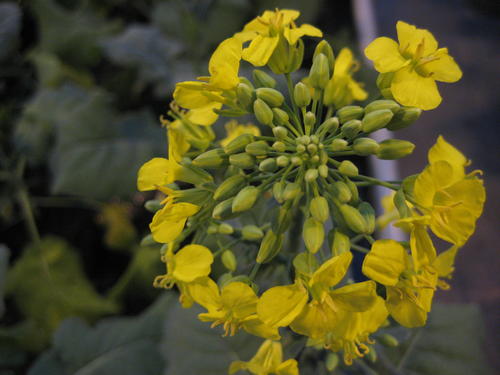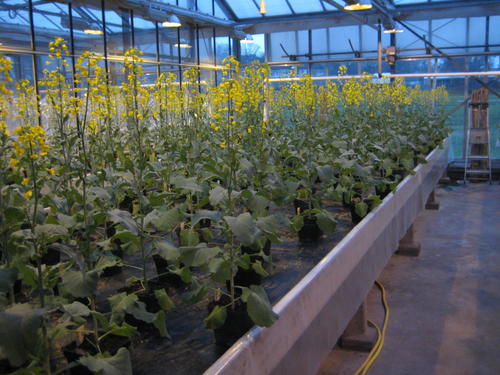Using Plant Hormones to Boost Agricultural Crop Yield
Researchers at Freie Universität Berlin have discovered genes that determine oilseed rape yield
№ 045/2021 from Mar 18, 2021
A research team at Freie Universität Berlin led by the biologist Professor Thomas Schmülling has recently published a study on their success in increasing oilseed rape yield by mutating the specific genes responsible for degrading the plant hormone cytokinin. This process stimulates the formation of flowers and seed-bearing structures, and increases the seed weight of the agricultural crop. The researchers, whose work is carried out as part of the SEEDS project funded by the German Federal Ministry for Education and Research, are now set to examine the significance of these yield-related genes in further field trials. Their findings have the potential to innovate the cultivation of cereals as well, which possess the same genes as oilseed rape. The results of the study were published in the Journal of Experimental Botany with research associate Dr. Ireen Schwarz as lead author.
Agricultural crop yield depends on a wide range of factors – one of these being plant hormones. The number of flowers the plant forms is crucial in increasing yield, as these produce seeds after they have been fertilized. The plant hormone cytokinin is important because it influences flower formation. Cytokinin oxidase/dehydrogenase (CKX enzyme) serves as the catalyst in the degradation process of cytokinin. In a previous study, Schmülling and his team succeeded in identifying two especially important CKX genes in the model plant, thale cress (Arabidopsis thaliana). The deactivation of CKX3 and CKX5, as these genes are called, resulted in a higher cytokinin content and thus more flowers and seeds. In fact, the team managed to increase the seed yield by over 50 percent.
“In the SEEDS project we investigated whether we could apply these results to oilseed rape, as it is closely related to thale cress,” explains Dr. Schwarz. She continues, “We were able to knock out six of the 23 CKX genes that occur in oilseed rape, via a process known as tilling.”
The new lines were cultivated in a greenhouse and in the field. Flower and pod formation on the main stem was closely monitored by the researchers, who found that they were able to increase the number of flowers by over 50 percent, while seed weight grew by 20 to 30 percent. “These findings show that our previous research could be used in applied plant cultivation,” says Schmülling, who claims that CKX genes could be used to develop new, high-yield varieties of oilseed rape. The team’s next step will be to undertake further field studies on a much larger scale to confirm their results.
The researchers also see great potential in applying their findings to other agricultural crops that have CKX genes, especially cereals and rice – in the case of the latter, Schmülling says, these genes have already been proven to play an essential role in increasing yield. “What’s really fascinating about our research is that the role of these genes has been retained in plants as vastly different as rice and oilseed rape throughout evolution,” says Schmülling.
The development of high-yield varieties in modern agriculture, which began in the 1960s, is generally referred to as the Green Revolution. The American agronomist Norman Borlaug received the Nobel Peace Prize in 1970 for his contributions to increasing food supply through agricultural production.
According to Thomas Schmülling, crop cultivation is facing a second Green Revolution thanks to new innovative processes: “An increasing number of new processes are used in crop cultivation, such as identifying the genes that are important for yield or the adaptation of agricultural crops to changing environmental conditions, as well as targeted mutation by means of modern processes such as tilling or CRISPR/Cas gene editing.” Schmülling explains that the growing world population and the decreasing availability of suitable farmland mean that increasing the yields of agricultural crops is currently a key objective of plant cultivation.
The study was financed by a grant from the German Federal Ministry for Education and Research (BMBF) in the framework of the transnational program PLANT-KBBE for the project SEEDS. The acronym PLANT-KBBE stands for “Transnational Plant Alliance for Novel Technologies – towards implementing the Knowledge-Based Bio-Economy in Europe.” The international funding program received joint support from France, Spain, and Germany. The company Bayer CropScience was the economic partner of the project.
Press photo 1
The number of flowers produced by the oilseed rape plant is crucial for yield. The plant hormone cytokinin regulates the formation of flowers. Mutating the plant in a targeted manner allows the development of new oilseed rape varieties.
Image Credit: Dr. Ireen Schwarz.
The photos are available for download by the media. They are free of charge if used in the context of the press release and due credit is given the photographer.
Press photo 2
Further Information
Publications
- Ireen Schwarz, Marie-Therese Scheirlinck, Elisabeth Otto, Isabel Bartrina, Ralf-Christian Schmidt, Thomas Schmülling (2020) Cytokinin regulates the activity of the inflorescence meristem and components of seed yield in oilseed rape. In: Journal of Experimental Botany, Vol. 71, No. 22 pp. 7146–7159, DOI: 10.1093/jxb/eraa419 .
- Article commenting on the previous research: Paula E. Jameson and Jiangcheng Song (2020) Will cytokinins underpin the second ‘Green Revolution’? In: Journal of Experimental Botany, Vol. 71, No. 22 pp. 6872–6875; doi: 10.1093/jxb/eraa447.
Contact
Prof. Dr. Thomas Schmülling, Freie Universität Berlin, Institute of Biology, Dahlem Centre of Plant Sciences – Applied Genetics, Tel.: +49 30 838 55808, Email: thomas.schmuelling@fu-berlin.de


